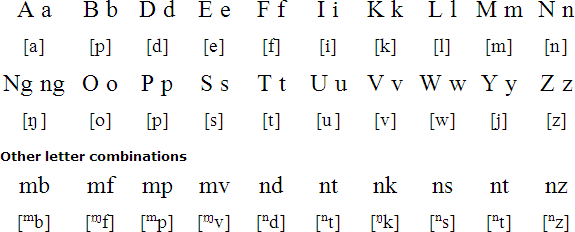Kongo is a Bantu language spoken in the Democratic Republic of the Congo (DRC), the Republic of the Congo, and Angola. The people who speak Kongo are known as Bakongo. In the DRC there are about 8 million speakers of Kongo, including 3 million native speakers. They are found particularly in the Kinshasa and Kongo Central provinces, and along the Congo River.
There are about 2.5 million speakers of Kongo in Angola in the provinces of Bengo, Malanje, Cabinda, Kuanza Norte, Uíge and Zaire. In the Republic of the Congo there are about 16,500 Kongo speakers in the Boko district of the Pool department.
Kongo is also known as Koongo, Congo, Kikoongo or Kikongo. Dialects include South Kongo, Central Kongo, West Kongo, East Kongo, South East Kongo and Nzamba.
A creole based on Kongo is used in the same region, and is various known as Kikongo de L'état, Kikongo ya Leta, Kituba, Monokituba and Munukituba.
Creolized versions of the language are used in rituals in Brazil, Cuba and Haiti, and Gullah, and Palenquero creole of Colmbia also contain Kongo elements.
Kongo first appeared in writing in a catechism produced under the authority of Diogo Gomes during the 16th century. It was the first Bantu language to be written with the Latin alphabet. Other material in and about Kongo was published during the 17th century, including a grammar in 1645 and a dictionary in 1648. A complete translation of the Bible in 1905.
Today there is no standard way of writing Kongo, but the language is used in some literature, newspapers and other printed material. It is taught in most schools in the Democratic Repuiblic of the Congo.

The function of the apostrophe in the sample text is not know.
Bizingi bioso bisiwu ti batu bambutukanga mu kidedi ki buzitu ayi kibumswa. Bizingi-bene, batu, badi diela ayi tsi-ntima, bafwene kuzingila mbatzi-na-mbatzi-yandi mu mtima bukhomba.
All human beings are born free and equal in dignity and rights. They are endowed with reason and conscience and should act towards one another in a spirit of brotherhood.
(Article 1 of the Universal Declaration of Human Rights)
Information about Kongo | Numbers | Tower of Babel
Information about the Kongo language
https://en.wikipedia.org/wiki/Kongo_language
https://fr.wikipedia.org/wiki/Kikongo
https://www.ethnologue.com/language/kng
http://www.britannica.com/topic/Kikongo-Kituba
Aka, Aushi, Bafaw-Balong, Bangi, Bangubangu, Basaa, Bemba, Bembe, Bena, Benga, Bhaca, Bila, Bube, Budu, Bujeba, Bukusu, Bulu, Bushong, Central Kilimanjaro, Central Teke, Chichewa, Chokwe, Chuwabu, Comorian, Dciriku, Digo, Duala, Eton, Ewondo, Fang, Fuliiru, Ganda/Luganda, Gogo, Gusii, Gwere, Gyele, Haya, Hehe, Herero, Ibinda, Idaxo-Isuxa-Tiriki, Ikizu, Ikoma, Jita, Kabwa, Kako, Kamba, Kanyok, Kiga, Kikuyu, Kimbundu, Kinyarwanda, Kirundi, Kisi, Kobo, Kogo, Komo, Kongo, Konjo, Koti, Kukuya, Kunda, Kuria, Kwambi, Kwasio, Lambya, Lengola, Lingala, Loma, Lozi, Luba-Katanga, Luchazi, Lunda, Luvale, Luyana, Makaa, Makonde, Makhuwa, Mandekan, Maore, Masaaba, Mbama, Mbere, Mbosi, Mbukushu, Mbunda, Mbuun, Mende, Mongo, Mpiemo, Mushungulu, Mwani, Myene, Nambya, Nande, Ngoni, Ngwii, Njebi, Nkore, North Teke, Northern Ndebele (South Africa), Northern Ndebele (Zimbabwe), Northern Sotho, Nyamwezi, Nyakyusa, Nyemba, Nyole, Nyoro, Nyungwe, Nzadi, Oroko, OshiWambo, Pagibete, Punu, Ronga, Safwa, Seki, Sena, Sengele, Shona, Soga, Songe, Southern Ndebele, Southern Sotho, Suba, Sukuma, Swahili, Swati, Taita, Talinga, Tanga, Tembo, Tetela, Tonga, Tooro, Tshiluba, Tsonga, Tswa, Tswana, Tumbuka, Umbundu, Venda, Vili, Vwanji, West Teke, Xhosa, Yakam, Yansi, Yao, Yasa, Yeyi, Zigula, Zinza, Zulu
Languages written with the Latin alphabet
Page last modified: 19.12.23
[top]
You can support this site by Buying Me A Coffee, and if you like what you see on this page, you can use the buttons below to share it with people you know.

If you like this site and find it useful, you can support it by making a donation via PayPal or Patreon, or by contributing in other ways. Omniglot is how I make my living.
Note: all links on this site to Amazon.com, Amazon.co.uk
and Amazon.fr
are affiliate links. This means I earn a commission if you click on any of them and buy something. So by clicking on these links you can help to support this site.
[top]